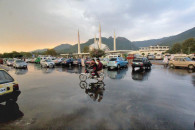Climate change in the hills of Murree
In past three years, autumn means drought, leaving traditional crops little time grow to a harvestable size.

Personal climate observations over the last 15 years of mountain life in the Murree Hills clearly show that the seasons are increasingly out of kilter: The first five winters guaranteed snow and lots of it, spring arrived, slowly, around the beginning of April when apricot and plum trees blossomed, summer began mid-June and faded away by the end of September. Autumn was October – November and then the four month winter moved in. Spring was warm with regular showers, summer brought the monsoon, autumn was dry, winter bitterly cold with night temperatures regularly below minus five degrees Celsius and snow putting in a regular appearance. Initial temperature and rainfall changes became apparent 10 years ago, worryingly so over the last five years, and were taken with a pinch of salt, blamed on a bad year that would right itself next time around, but it didn’t.
Spring can now arrive in February, summer is here by mid-April and lasts until at least mid-October. Autumn then lingers until the end of December, with winter often snowless and relatively mild, crammed in to a brief six, possibly eight, weeks. Autumn used to be reasonably dry with the occasional thunderstorm, but for three consecutive years, autumn now means drought and, for the first time this year, so does spring. What this means is that traditional cropping patterns are no longer viable.
Soil temperatures are high enough to begin seed sowing by the beginning of March, it used to be the end of April, but without necessary rain, nothing will germinate without regular irrigation. Unless huge quantities of water are stored on site, which is not common practice, drought conditions ensue and crops burn up well before the arrival of the summer monsoon. Waiting until the monsoon arrives, around the beginning of July, before undertaking seed sowing means that traditional crops do not have enough time to grow to a harvestable size before being hit by autumn drought. The result is no or meagre crops.
Wildlife is hard hit too; the climatic change is happening far too quickly for birds, animals and plants to adjust. Swallows, for example, used to arrive here in April but over the last 10 years have flown in 10–14 days earlier each spring. This year, they arrived on January 23. Birds began nesting in mid-February when apricot and plum trees were in full bloom, but a totally unexpected one-day snowfall accompanied by a bitter wind, on April 18, wiped everything out within two hours. The following day felt like summer. Climate change, you see, is also erratic, which makes planning for the future an extremely challenging task.
Published in The Express Tribune, July 12th, 2011.












COMMENTS
Comments are moderated and generally will be posted if they are on-topic and not abusive.
For more information, please see our Comments FAQ